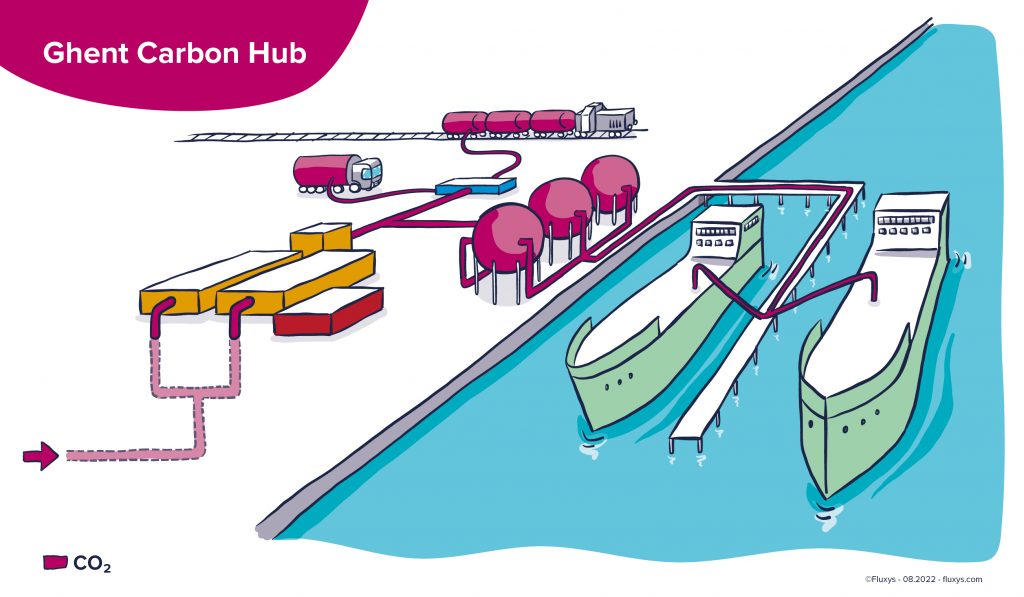18 August 2022 – Fluxys, ArcelorMittal Belgium and North Sea Port have started a feasibility study for the Ghent Carbon Hub project, an open-access CO2 storage and liquefaction hub in the Ghent part of North Sea Port.
Besides the use of carbon-neutral energy, carbon capture, utilisation and storage (CCUS) is essential for CO2 intensive industries to achieve net zero emissions, especially in hard-to-abate sectors with processes inherently generating CO2 emissions.
Fluxys, ArcelorMittal Belgium, and North Sea Port are pressing ahead to develop a key infrastructure accommodating the CCUS chain. Ghent Carbon Hub is set up as an open-access hub to transport and liquefy CO2 from emitters, provide buffer storage and load the liquefied CO2 onto ships for onward permanent storage. The feasibility study has now started and commissioning is targeted for 2027. Ghent Carbon Hub will have a capacity to process 6 million tonnes of CO2 per annum (MTPA), equivalent to around 15% of Belgian industrial CO2 emissions.
The project will benefit from Fluxys’ wide experience in terminalling activities, while Fluxys is also developing an open-access CO2 transmission backbone in Belgium. Ghent Carbon Hub connects into Fluxys’ CO2 backbone, allowing CO2 emitters from the North Sea Port area and other industrial clusters to transport their captured CO2 to the hub or locations of reuse.
Pascal De Buck, CEO Fluxys: “We are delighted to launch this CO2 infrastructure project with ArcelorMittal Belgium and North Sea Port. Together with our partners, we offer strong and complementary know-how and expertise for providing reliable and efficient decarbonisation solutions, essential for achieving climate change objectives and ensuring the long-term viability of the economy. Ghent Carbon Hub is an integral part of the full-scale Fluxys CO2 approach, offering emitters in North Sea Port and the wider area the opportunity to convey their captured CO2 through our backbone.”
Manfred Van Vlierberghe, CEO ArcelorMittal Belgium: “ArcelorMittal Belgium has a passion for sustainability and circularity. We aim to reduce our CO2 emissions by 35% by 2030 compared to 2018, and to become climate neutral by 2050. The combination of a new Direct Reduced Iron (DRI) plant alongside a sustainable, state-of-the-art blast furnace enables the creation of unique synergies in ArcelorMittal Belgium’s roadmap to climate-neutral steelmaking. But we are also focusing on other decarbonisation initiatives, such as CCS, where we capture the CO2 and transport it to a CO2 hub within North Sea Port for storage. We are able to reduce our environmental impact faster, thanks to projects such as this, which embody the cooperation and innovation that we need in order to realise our ambitious climate objectives.”
Daan Schalck, CEO North Sea Port: “North Sea Port has the ambition to halve CO2 emissions by 2030 and to be a carbon-neutral port by 2050. Total CO2 emissions in the port are 21.5 million tons. As a first step, the capture and storage of CO2 (Carbon Capture and Storage (CCS)) will have to be increased. Technological developments will be key to the reuse of CO2 over time (Carbon Capture and Utilisation (CCU)). The capture and storage of CO2 is a necessary intermediate step towards its large-scale reuse. To this end, North Sea Port is fully engaged to facilitate this CO2 infrastructure project to make it happen.”



